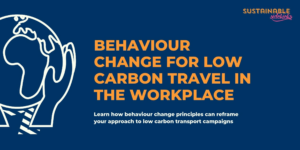Employee climate perks the antidote to flight shame
Carbon impact of flights
- New York is circa 3.5 tonnes
- Amsterdam is 250 kgs versus 28kgs on the train
- Barcelona is 590 kgs versus 72kgs by train (comparisons from ecopassenger)
Reducing employee air miles
So what can you do about this? Clearly shaming people is not the solution and organising team holidays to Butlins, probably won’t suit everyone!
Queue Climate Perks! This is a free-to-join campaign that supports employers to give their employees an extra two days paid annual leave if they choose to travel by boat or train versus plane.
Further benefits are:
- Improved staff morale and loyalty as people feel their workplace is aligned with their values
- Staff benefits that differentiate from competitors
- The chance to be a leader in a business sector
Head to the Climate Perks website for more details.
Answering the overland travel barriers
Cost
When doing cost comparisons between train and plane travel, it is important to include the cost of:
- Airport parking or travel
- Checked-in luggage
- Transfers to the destination city as airports are usually not in the centre
UK train travel can be significantly more than European travel so check out Splitticketing.com or Splitfares.com for discounts, as these websites find the cheapest ticket combinations on a journey.
Time
Some journeys by train to places like France or Amsterdam can be comparable to a flight once the journey to the airport, check-in time, luggage waiting time and transfer to the city are taken into consideration.
Inconvenience
Check-in on Eurostar is around thirty minutes and you walk on to the train with all your luggage and walk off with it, what is inconvenient about this.
Trains also generally bring you to the city centre, rather than the outskirts of a city where airports are situated.
A holiday or an adventure
Of course this isn’t practical if people are trying to get away for a beach package holiday, but the other thing about train or overland holidays is to reframe the idea of what a holiday or an adventure is.
This is where the phrase “it’s about the journey, not the destination” comes into play. The joys of train travel should not be underestimated, especially when travelling across Europe. Seeing the diverse landscapes of the continent is in fact part of the holiday experience. Stopping off for two hours in Paris before heading to Barcelona.
Reducing business travel
Need some ideas for changing workplace travel habits?
join Livvy for Behaviour Change for Low Carbon Travel on 22nd November from 12-1.30pm



10% of all online courses go to grassroots charities.
20% of all consultancy and bespoke workshops go for rewilding.
50 free places are awarded to campaigners from underrepresented communities each year.


